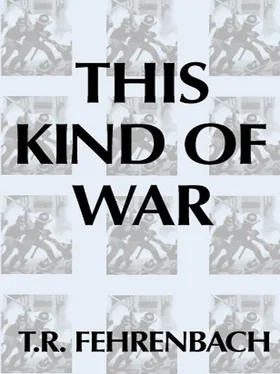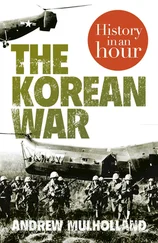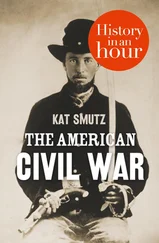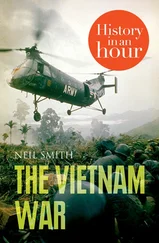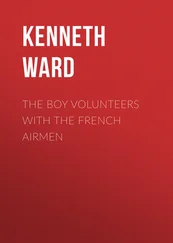South of the Farm Line, the granaries were low, the new crops not planted, and the waiting hard.
To the north, the waiting was also hard. Here, there were only the twill-clad hosts of the Eighth Army, making the roads rutted and dusty with their thousands of trucks. Eighth Army was firmly implanted now, its tents walled and floored with wood against the harsh seasons, its larger HQ's solidly timbered with an air of permanence. Its bright flags flew from tall poles, and the stones of its company areas were painted white.
Eighth Army had little to do, except put out more flags, and paint more pathstones, as months went by.
Still, the waiting was hard.
Still farther north, where the vehicles did not go, and the hills grew bare and dark, the waiting was hardest of all.
Here the untilled ground was dug in long furrows, and there were wire and sandbagged earth, and thousands of men lay in deep trenches and revetted bunkers.
And still farther north, among the outposts thrusting into the sullen Chinese hills, far in front of the main line of resistance, with spring at hand, men lay in cold, sleeting rain, and talked of peace.
Now and then artillery rumbled, and fire splashed the hills. Men's eyes, even while they talked of peace, kept to the north. Over there, in the black hills and misty valleys, nothing moved. The observation posts saw nothing; friendly aircraft hurtling overhead reported nothing.
Now and again, gunners fired, and in their hearts felt they fired at nothing.
Yet everyone knew that he was there—Old Joe Chink, Luke the Gook, the enemy. Unseen, he was real, massing in his deep tunnels and hollowed-out mountains. He had come before, slipping out of the night behind shrieking shell bursts, pouring into trenches and bunkers, shooting, killing.
He would come again, even while they talked of peace at Panmunjom.
On 16 April, while the eyes of the world and most of the correspondents were at Panmunjom, where the Communist side had just agreed to exchange sick and wounded POW's, the CCF struck to destroy the 7th Division's outpost line. The Chinese hit Eerie, the Arsenal, and swamped Dale.
The men on Pork Chop, an understrength company, E of the 31st Infantry, heard from the heights of enemy-held Hasakkol the wailing minors of Mongol music, the chanting with which Chinese liked to begin concerted action.
The sound was muted, as from out of deep tunnels. Listening as they ate supper, Lieutenant Thomas V. Harrold's riflemen cracked unhappy jokes. Numbering only seventy-six, they were in an extremely vulnerable place to play king of the Mountain.
The Division G-2 had word from secret line crossers of an imminent attack, and had informed Harrold. But somehow, in the inevitable mishaps of war, the word had not passed down to the outposts beyond Pork Chop.
With dark, these men strolled down to their listening posts on the outcroppings, and crouched down amid the flowering wild plums and other greenery. The night was clear, and starlit.
After 2200, two companies of heavily armed Chinese slipped out of Hasakkol and crossed the wide valley. They came on catfeet, and were onto Pork Chop, before the alarm could be given.
They broke over Easy's 1st Platoon in a wave of gunfire. Of 1st Platoon's twenty-odd men, seven survived.
Harrold fired one red flare, signifying he was under serious attack; then a second, requesting the artillery to flash Pork Chop. At 2305, 7th Divarty joined Chinese guns in firing on the hill, putting a horseshoe-like band of steel around its base, and firing proximity-fuse projectiles on top of it.
But the CCF were in the trenches and bunkers now, and close-in, hand-to-hand fighting erupted across Pork Chop.
Regiment sent two platoons to reinforce Harrold, one from Fox Company and one from Love. The Fox platoon became lost in the dark, and did not arrive; the men from Love, misunderstanding the situation, walked up the hill and came under Chinese fire. They had not understood the Chinese were already on the crest, and under surprise and shock of being taken under fire, they ran back down into the valley.
Pork Chop was overrun, but it was a maze of trenches, bunkers, and fortified positions. Harrold, and a number of his men, piling sandbags, ammunition boxes, and sleeping bags against bunker entrances and embrasures, fought the scattered parties of searching CCF off. With dawn, they were still holding, but for all practical purposes the hill had been lost.
Deep in his own bunker, Lieutenant Harrold hardly understood what had happened; the very nature of the fight had allowed him to view very little of it. From him his battalion commander had no clear picture of the situation on Pork Chop. Battalion thought the sending of one company forward to reinforce would be more than ample.
At 0330 Lieutenant Joseph Clemons, Jr., commanding K Company, was ordered to move his outfit forward just behind Pork Chop. From there he was to assault the hill, while two platoons from Love Company went up Pork Chop from the right.
From Joe Clemons' assault point, it was only 170 yards up to the fortified positions on Pork Chop—but the slope was steep, cratered, and rocky, and strung with wire.
It took King almost thirty minutes to reach the top of the ridge.
And there King's work began. The Chinese had burrowed into Pork Chop like rats, and their own artillery kept dousing the hill in regular timed patterns. In two hours the attack was carried forward only some two hundred yards, and the Americans' legs were exhausted. The length of the hill had crumbled into tumbled rubble under artillery fire, and each piece of rubble provided shelter for riflemen and grenadiers.
Meanwhile, the Love platoons, coming up on a narrow front on the right, had been chopped to pieces by the entrenched defenders on the crest. Ten men out of sixty-two who had attacked under Lieutenant Forrest Crittenden, came exhausted, under a sole surviving officer, into Joe Clemons' lines atop Pork Chop.
And by 0800 17 April, Joe Clemons was out of water and running short of both ammunition and men, a few feet away from the Chinese. The enemy was in poor shape, too, and if King Company could have mounted any kind of determined attack the Pork Chop battle would have been over—but the men remaining in King had almost no strength left. The steep Korean slopes wore men down faster than Chinese gunfire.
Shortly after eight, a few replacements came up the back slope of Pork Chop, joining Clemons' men. First Platoon, G Company, 17th Infantry, came in; the rest of George, 17th, was coming up the hill behind, under heavy artillery fire.
Clemons, seeing George's C.O., asked, "Now, what in hell are you doing here?"
The George Company commander, Lieutenant Walter Russell, was Clemons' brother-in-law, and the last Clemons had heard from him he was in the States. Russell said he had been sent to help King Company with the mop up, and then to withdraw from the hill.
The people at Battalion and Regiment simply did not know what was going on. King, now composed of only thirty-five tired survivors, ten men from Love, and twelve men of Harrold's Easy Company rescued from the rubble, wasn't mopping up—it was trying to hold its own.
At the same time that Russell's men were struggling up the cratered slopes, a fresh Chinese company pushed onto the other end of the ridge. With fresh men on the hill, the battle suddenly blazed up again. But again, stumbling, shooting, and grenading about in the fantastic jumble of tumbled trenches, shattered bunkers, and shellholes on Pork Chop, neither side was able to make progress.
The fresh men were rapidly chewed up. The barrage fire on the hill was horrendous in weight of metal, and almost unceasing. Soon, Russell's George Company, 17th, was down to fifty-odd men.
At noon, Joe Clemons received a fantastic message from his battalion C.O., delivered by the battalion S-2, who stumbled into the bunker on Pork Chop from which Clemons was directing the battle. Clemons was ordered to send any and all survivors of Easy Company to the rear at once, and Russell was to take his company off the hill at 1500.
Читать дальше
